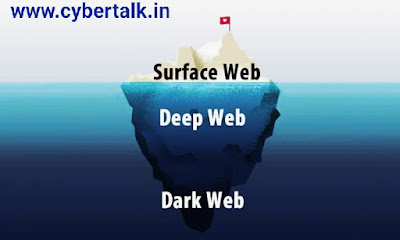Have you ever questioned how to find "Internet Material" that isn't available to the general public?
Fact: 95 percent of the information on the deep web is available to the public. The internet is like an ocean, and certain parts of it are still unexplored. There are approximately 550 billion individual records on the deep web alone.
But, before we get into the specifics of the Secret Search Engine, let's talk about the usual and most popular search engines, as well as the difference between the normal and deep web.
Visible Web, Deep Web & Dark Web
The visible web, also known as the surface web, is well-known. The surface web, also known as the internet, is the most popular and commonly used internet that people access on a daily basis.
It can be used by the general public without the use of any advanced software and can also be accessed using normal web browsers and search engines such as Mozilla Firefox, Internet Explorer, Google Chrome, and others.
The majority of users believe that the internet is limited to a few services, but this is not the case. The internet contains a wide array of resources that run in the background and are shielded from the public's view.
The Deep Web is a web that cannot be easily accessed using conventional search engines such as Google, Yahoo, and others. Users can require specialized tools to gain access.
The standard search engines do not index or search this section of the site. Since they not using any top-level domains (TLDs) like. gov, .com, and others, the sites are inaccessible from regular search engines. They also limit the visibility of their websites on search engines.
In general, these sites contain databases and documentation about everyday web activity, such as social media account databases and bank websites. Moreover, these data changes on a regular basis in response to information updates and is presented in a particular way based on the user's permission.
The deep web, also known as the invisible web or hidden web, is a subset of the surface web that is not indexed by traditional search engines.
The content stored on these deep web sites is hidden behind HTTP forms, which have a variety of applications in the banking and IT industries, including storing information about many people's social media profiles.
The dark web is distinct from both the surface and dark internets. The deep web is a collection of the internet's uncharted territory.
The deep web, on the other hand, is made up of sites designed to avoid being found by search engines; these sites typically use hidden or masked IP addresses and should only be accessed using a special set of tools and a browser like Tor.
The dark web is a section of the internet where illegal internet activity takes place and other mysterious businesses manage around the world.
This isn't entirely accurate. The dark web requires users to anonymize the software or tool they have access to. The dark and deep web are two branches with the same tree, but they grow in opposite directions.
The dark web is the negative side of the unexplored internet world, whereas the deep web is the positive side of the unexplored web, with only web pages that are not indexed by any search engine. There are various search engines offered in the industry depending on the type of internet area we want to investigate.
What kind of information is stored on the deep web?
First, we'll go over the positive aspects of the deep web, and it's not entirely true that the deep web is only used for illegal purposes. The deep web is also used by many websites to access their databases and other information.
These websites will primarily feature social media blogs, text, and voice chat. Book clubs, fan clubs, and video game clubs are examples of other groups based on survival or another satanic sect that believes in other mythologies.
Hidden Answers, a popular site for finding secret answers similar to Yahoo Answers but essentially a very secret version of it, is one of the most well-known deep web sites.
To ensure the users' privacy and security, communication on the deep web can also be done in an encrypted manner. The following is a list of some of the deep web's content.
- View to many major companies' and educational institutions' online databases
- Password-protected access to sites that are only available to users, such as Netflix and Amazon Prime Video, as well as free lectures from technical skills courses such as Udemy and Coursera.
- You can also see the full details of a person's personal profile on social networks and other sites.
- Access to the online exam sites is limited in time.






